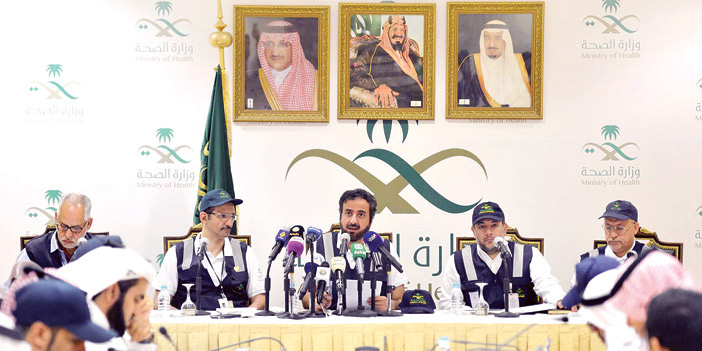
‘Massive efforts were made to ensure disease-free Haj’
Health Minister Dr. Tawfiq Al-Rabiah announced on Wednesday that the current Haj season was free from epidemic diseases and that pilgrims were generally in good health.
The Ministry of Health mobilized all human, material and mechanized means to provide preventive, curative, emergency and awareness services to pilgrims. “The ministry is always aware of its responsibilities to the pilgrims and wants to ensure that they perform their rituals easily and comfortably,” he said at a press conference in the tent city.
The minister said that the ministry had prepared 25 hospitals at the holy sites in Makkah and Madinah in addition to 158 medical centers; it also recruited 26,000 medical practitioners and administrators to look after the health of the pilgrims.
The ministry also operated a 20-bed hospital near the Grand Mosque, established 10 health centers in Arafat and expanded rooms for sunstroke victims in six hospitals, he said.
Detailing the ministry’s services to the pilgrims, the minister said an evacuation area was created in the Jamrat area, while health requirements and preventive control work were carried out by 15 health control centers.
He added that the ministry’s teams provided preventive measures as well as meningitis and polio vaccines to more than 690,000 pilgrims.
Early awareness programs and field visits by the ministry’s teams played a key role in minimizing the number of sunstroke and sun stress cases, he said.
About 400,000 pilgrims visited the ministry’s facilities during the current Haj, he said, adding that the number of cardiac catheterization, open-heart and kidney dialysis operations stood at 306, 27 and 1,730, respectively.
Some 329 people were treated by field medical centers and hospitals for sun stress and 86 people were treated for sunstroke, he said.
The minister said the ministry had faced the challenges of a large number of pilgrims in addition to the hot weather which caused sunstroke and stress among the pilgrims.
He said the ministry had great experience in dealing with large crowds during the short period of Haj.
In a related development, the World Health Organization (WHO) concluded its mission to Saudi Arabia which was to help the Ministry of Health ensure a safe pilgrimage for all.
“So far there has been no major health threat or an event of concern, and no major disease outbreaks reported among the nearly two million pilgrims visiting the holy sites,” said Rana Sidani, senior communication officer at WHO.
“In preparation for the Haj, the Ministry of Health, together with WHO, conducted a strategic health risk assessment of the health hazards that might occur during the pilgrimage,” she said.
“Based on the requirements of the International Health Regulations (2005), the ministry put in place several public health mitigation measures covering areas such as infection prevention and control, points of entry, laboratories, coordination, risk communication and community engagement. Additionally many measures have been taken to reduce the effects of high temperatures on pilgrims, including awareness campaigns on preventing sun strokes and heat exhaustion.
“Preliminary information indicates a decrease in morbidity and mortality from seasonal influenza compared to last year. This might be related to the Ministry of Health’s decision to make seasonal influenza vaccine compulsory for all local pilgrims.
Some countries also vaccinated their pilgrims against seasonal influenza, in accordance with Saudi Arabia’s health requirements for the Haj.
“No cases of Middle East respiratory syndrome coronavirus (MERS-CoV) have been reported so far among the pilgrims. Of 344 samples collected and tested by the national public health laboratory, none was found to be positive for MERS-CoV.”

























